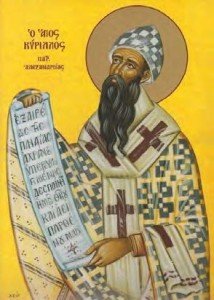In the last issue I began sharing with my readers information about the Core Group of feasts that constitute our yearly worship. The doctrinal principles celebrated implied in the Core Group are repeated in the second group of post-Nicene feasts which is called the Cyrillian Group.
Around 318-320, the Alexandrian priest Arius began to expound views on the nature of Christ which were soon condemned as heretical. According to the Arian heresy, since the Godhead was necessarily unbegotten and Christ was begotten of the Father, Christ was not co-eternal with the Father and therefore not truly divine. Eastern theologians thought that this eroded their concept of redemption, which relied on the complete humanity as well as the complete divinity of Christ to reconcile men to God.
The Arian heresy truly created theological division within the Empire which, in turn, led to political division. We must remember that Church and State were one under the leadership of the Emperor. To counter this division, Constantine called the First Ecumenical Council at Nicaea. The Council condemned Arius and declared Christ to be true God and true man and of one substance with the Father (homoousios). This was by no means the end of Arianism, however. United under Eusebius of Nicomedia, the Arian faction succeeded in reasserting itself before Constantine died in 337. Under Constantius II and Valens the Arians received support which enabled them to banish many of their opponents and it seemed likely to bring them ultimate victory.
The situation dramatically changed with the accession of Theodosius I in 379. He enjoined his subjects to profess the faith of the bishops of Rome and Alexandria, that is the faith of Nicaea, and promulgated a series of decrees against the various heresies, removed the Arian bishop of Constantinople, and called the Second Ecumenical Council at Constantinople in 381. Presided over by Meletius, the patriarch of Antioch, who had been exiled for his orthodoxy by Constantius II, this Council upheld Nicene theology and denounced Arianism. Theodosius continued to issue decrees against heretics and pagans alike and made the Nicene interpretation of Christianity the official religion of the empire.
The Church we are today was only established after much struggle and controversy. The truths that we profess were hard fought. Indeed, we do well to appreciate the doctrines of our Church. It was only because of the guidance of the Holy Spirit that we have them.

